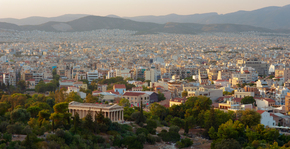 Greece, a 182-year-old South Europe republic, has run out of money in its fifth consecutive year of recession. A June 17 election, that itself will cost the tiny mountainous country $65 million to set up, will decide the fate of the country's 11 million residents.
Greece, a 182-year-old South Europe republic, has run out of money in its fifth consecutive year of recession. A June 17 election, that itself will cost the tiny mountainous country $65 million to set up, will decide the fate of the country's 11 million residents.A May 2012 Parliamentary election resulted in a deadlock among seven competing parties. At stake for Greece is a $212 billion loan package from Eurozone members.
Greece has received two smaller bailouts so far. To get the rest of the funds, Greece has to promise to slash $15.5 billion from its operating budget over the next two years.
That is the heart of the problem. Almost all of the seven political parties say cutting back $15.5 billion in two years is too short a time to accomplish the exercise. They suggest doing it over a half dozen years instead.
But Germany, one of the main backers of the bailout, is stubbornly refusing to change the rules of the original bailout deal. Instead, inspectors from the Eurozone, International Monetary Fund and European Central Bank are scheduled to visit Greece either before or after the June 17 election to see if the country is complying with the bailout parameters.
If it is, it will receive more bailout funds, initially about four billions euros still not distributed from March. If it isn't, Greece faces expulsion from the European Union where it has been a member since 1981. It has been a member in the Eurozone since 2001 and in NATO since 1952. Greece is a founding member of the United Nations.
Unemployment in Greece is 21 percent and rising daily. State employees' wages already have been cut 30 percent. A growing sentiment in the country is leaning towards leaving the Eurozone, even though politically, Greece is considered to be in Western Europe.
Anti-police street fighting and noisy nightly crowd rallies have surfaced in many Greece cities since the first of this year.
The Socialist party, which ran Greece for decades and was in power when Greece first asked for foreign aid in 2010, is running behind in the polls and in the May parliament election.
The center right New Democracy party appears to be the top dog. The Coalition of the Radical Left called the Syriza party is second in line. Eurozone officials hope the two parties can form a coalition party in the June 17 election that will allow the bailout to go forward.
The bailout deal allows for a possible relaxation of the bailout targets if the recession worsens. Gross domestic product (GDP) slumped by 6.2 percent in the first quarter, versus an estimate by Eurozone officials and the International Monetary Fund for a 4.7 percent contraction for the full year.
Greece's deficit is planned to shrink to 7.3 percent of GDP this year from 9.3 percent in 2011.

 By
By 